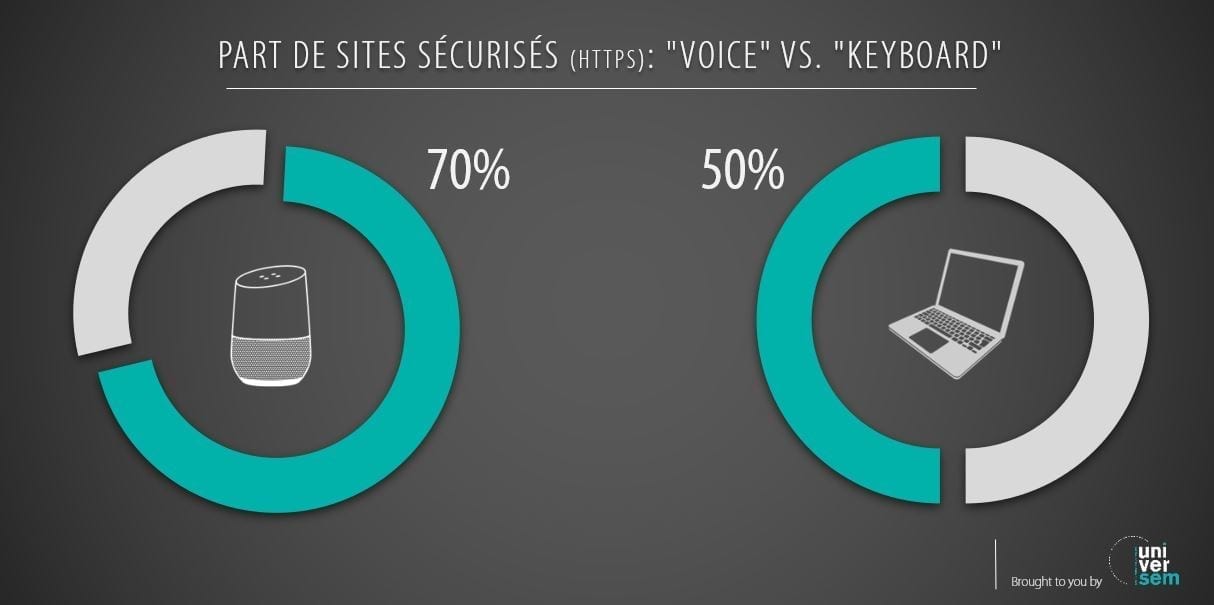The number of voice search queries increase rapidly. How should you optimise your website according to this trend? Here is a question that is still difficult to answer. Over recent months, we tested the results proposed by Google Home Assistant and by Alexa via Echo Dot. It would appear, in particular, that the load speed, security level and authority of your domain are among the criteria that positively or negatively influence your position in search results.
Based on our observations, we propose a web indexing method. This is, unfortunately, not yet mature but nevertheless offers great Voice SEO prospects. There is consequently no doubt as to its evolution over the coming months.
Voice Search relies in fact on the same basic principles as a ‘traditional’ search query. The organic SEO tactics already deployed around your website therefore remain perfectly relevant.
Yet, at a time when the Mountain View giant is looking to stand out as the supplier of all the answers, it is essential that you identify the questions your users address to Google to offer the most adequate response. A search by voice generally results in a unique response. This point has already been tackled in one of our previous articles about Voice Search.
So that we can guarantee the quality of the theories we put forward, we have also taken the time to analyse what other organisations in the world of SEO are already capable of observing (for example with this interesting post from « Search Engine Journal »: Google Answers How to Optimize Content for Voice Search). Apparently, our results are in line with theirs. The following elements are therefore the factors that influence your position on Voice Search.
SEO for Voice Search: the V.E.R.B.A.L.S. method
V-elocity
This is one of the most debated dimensions of SEO because its impact is not always obvious. However, your site’s load speed appears to directly influence its position in the results offered by Voice Search. This vision is shared by many of our peers, some of whom claim an obvious link between proposed Featured Snippets (optimised extracts drawn directly from relevant sites) and the site’s load speed.
E-ngagement
The second factor that would influence your site’s position in vocal search results: positive signs from social media. Number of followers, reach and, of course, engagement with regard to your publications are all dimensions, the influence of which is not to be neglected. During our tests, we noted that all listed sites benefited from a certain degree of renown on social media.
R-ich
Not surprisingly, sites with rich contents benefit from better indexing. This point is also relevant to some of the elements listed above. A site with contents that offer a clear answer to the questions posed by its audience, benefits from better vocal web indexing.
B-eacons
This point is somewhat similar to the previous one, but it refers more specifically to the microdata proposed by your site. Not surprising, since they largely facilitate web indexing in particular, by highlighting the key sections on each of your pages. Yet it’s not always easy to identify which ones to exploit. Here is a small list of easy elements to implement:
- Image
- Author
- Date published
- Date modified
- Type of Content / Format (e.g.: Blog, product information sheet, etc.)
A-uthority
It goes without saying that, for an equivalent search query, a domain with a certain level of authority will be better indexed than a new and freshly registered domain. This point is also relevant to the second point in our methodology on engagement.
L-ocal
Yes, the user’s geographical location greatly influences proposed results and we find this perfectly logical. Nevertheless, at equivalent distance, a trader or a restaurant owner with a more substantial ‘Google My Business’ profile, will come up in prime position. You must therefore take care from the very start to perfect the finest details, to regularly share publications and to encourage your clients to post positive reviews.
S-ecurity
Security plays a prevailing role in organic SEO. If you take the time to analyse the results offered by the first page on Google, you will notice that the majority of sites are in https format. This point is all the more important in a voice-centric world since, 7 times out of 10, proposed results are all secure. And this is far from a trivial affair. Indeed, the Mountain View giant has just announced its intention to penalise sites that are not secure by the month of July. Of course, this will not directly penalise your web indexing but just imagine your visitors’ reactions when, as soon as they make their first click, a huge pop-up appears warning them of the risks should they remain on your platform. They will most likely leave, hence increasing your bounce rate. Security is therefore an essential feature.
Conclusion
Voice Search is as yet in its early days. The number of vocal queries should drastically increase over the coming months and we may well see new dimensions likely to influence your position on search engine results. But we hope that this article has offered you a better insight into the areas that can currently positively or negatively impact your platform in a voice-centric world.
Should you have any questions, please feel free to contact our team of SEO experts. They’ll be delighted to help you.


